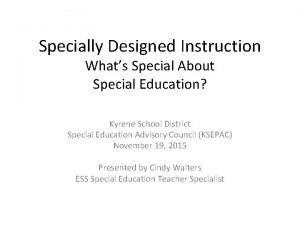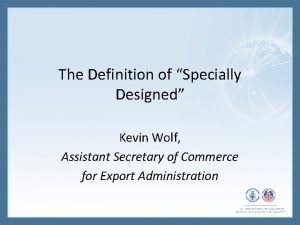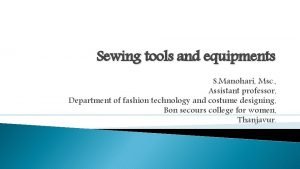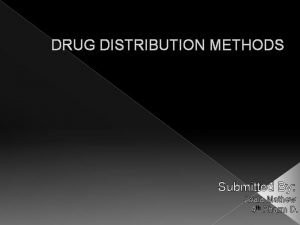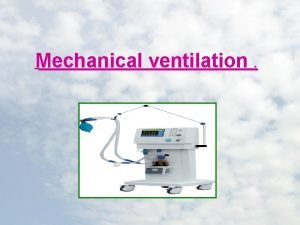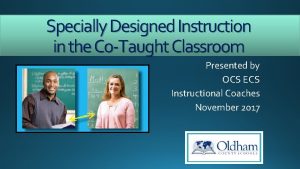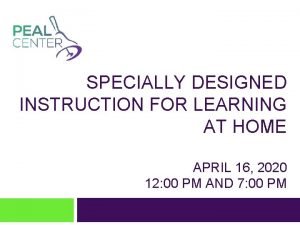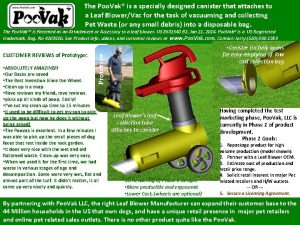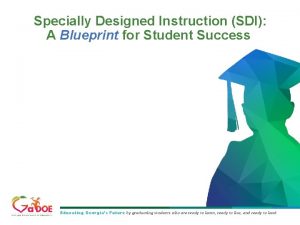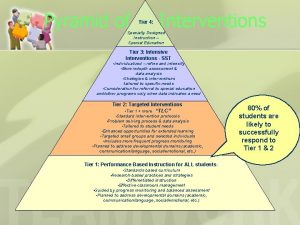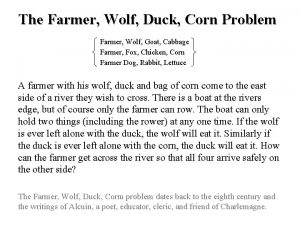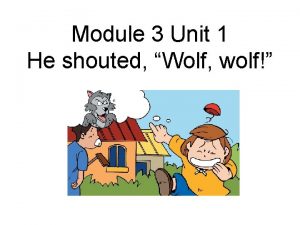The Definition of Specially Designed Kevin Wolf Assistant






























- Slides: 30

The Definition of “Specially Designed” Kevin Wolf, Assistant Secretary of Commerce for Export Administration

The Published “Specially Designed” Definition • Read pages 22728 and 22729 of Commerce’s Federal Register notice published on April 16, 2013 (78 Fed. Reg. 22660) • EAR “specially designed” definition is in Part 772 and became effective October 15, 2013. • The “specially designed” definition is common to the EAR and ITAR, although slight differences in wording to make definition EAR and ITAR specific. 2

Goals • Wanted to develop something so that if ten different people in industry and government got the same set of facts then they would all come to the same conclusion. • Necessary to define clearly what would be caught by new ‘catch-all’ controls moving to the CCL from the USML and also to harmonize definition throughout the CCL and the USML. • Wanted a structure that would allow for evolution and clarification as put into practice. 3

Reason for structure • In working through options for a definition, became clear that it was easier to clearly describe what was not “specially designed” than what was. • One sentence definitions leave too much room for ambiguity and subjectivity. • So, we established broad ‘catches’ (paragraph (a)) and specific, objective ‘releases’ (paragraph (b)). 4

Take a breath • We realize this is a new approach and will, at first, seem complicated. • Based on our testing, it becomes much easier to apply than the “design intent” aspects of currently undefined term. • The content is not radical, but rather codifies existing concepts and good faith applications of the term to further USG policy objectives. 5

Steps • To determine whether an item is “specially designed, ” one answers a series of yes/no questions. • Be sure to apply existing EAR definitions (such as “development, ” “production, ” and “knowledge”) and also new EAR definitions (such as for “part, ” “component, ” and “end item. ”) 6

Paragraph (a)(1) ‘catch’ • Paragraph (a)(1) ‘catches’ any item that: as a result of “development” has properties peculiarly responsible for achieving or exceeding the performance levels, characteristics, or functions in the relevant: -ECCN, or -U. S. Munitions List (USML) paragraph. 7

Paragraph (a)(1) comments • Paragraph (a)(1) is mainly used for determining whether an end item or material is “specially designed, ” although it also applies to other items subject to the EAR. • For end-items and material, paragraph (a)(1) is the entire “specially designed” definition – meaning (a)(1) acts as the ‘catch’ and ‘release. ’ If your end item or material is not ‘caught’ under (a)(1), then it is NOT “specially designed. ” • For “parts, ” “components, ” “accessories, ” “attachments, ” and “software, ” before determining not ‘caught’ under “specially designed, ” paragraph (a)(2) should be reviewed. 8

Paragraph (a)(2) “catch” • Paragraph (a)(2) ‘catches’ any “part, ” “component, ” “accessory, ” “attachment” or “software” that: Is for use in or with a commodity or defense article ‘enumerated’ or otherwise described -on the CCL or -the USML. 9

Understanding the ‘release’ introduction to paragraphs (b)(1)-(b)(6) • Paragraph (b) is only used for ‘releasing’ “parts, ” “components, ” “accessories, ” “attachments” or “software. ” • A “part, ” “component, ” “accessory, ” “attachment, ” or “software” that meets the criteria of one or more of the paragraphs under (b) is ‘released’ from “specially designed. ” • If you are reviewing a decontrol on the CCL that uses “specially designed, ” stop at paragraph (a) in your analysis. Do not review paragraph (b) for decontrols on the CCL that use “specially designed. ” 10

Quick cut questions for when may be beneficial to review (b) first it Quick cut question It may be beneficial to review paragraph (b) first - if answer is “yes” Was it identified in a past Commodity Jurisdiction (CJ) determination or approved interagency CCATS under EAR pursuant to Section 748. 3(e)? Yes QUICK TIP: See (b)(1). Note: Also will need to review the CJ or CCATS in question. Is it a fastener (e. g. , screw, bolt, nut plate, stud, insert, clip, rivet, pin), washer, spacer, insulator, grommet, bushing, spring, wire, solder? Yes QUICK TIP: See (b)(2). Is it being used in or with an item in “production” that is lowest level (least controlled) commodities or software (EAR 99 or AT-only ECCNs)? Yes QUICK TIP: See (b)(3). Was or is it being developed for use in or with controlled items as well as lowest level (least controlled) items (EAR 99 or AT-only ECCNs? ) Yes QUICK TIP: See (b)(4) and (b)(6) only if developed for AT-only and EAR 99 or EAR 99 only. Note: Requires documentation from development. Is it a general purpose commodity or software (meaning not for particular commodity or type of commodity)? Yes QUICK TIP: See (b)(5). Note: Requires documentation from development. 11

Paragraph (b)(1) “release” Paragraph (b)(1) criteria Meets (b)(1) criteria Does not meet (b)(1) criteria CJs. Has it been identified in an ECCN paragraph that does not contain “specially designed” or as an EAR 99 item in a CJ determination? Yes. No. NOT “specially designed. ” NOT ‘released’ under (b)(1). Review other (b) ‘releases. ’ 748. 3(e). Has it been identified in an ECCN paragraph that does not contain “specially designed” or as an EAR 99 item in an interagency-cleared CCATS pursuant to § 748. 3(e)? Yes. No. NOT “specially designed. ” NOT ‘released’ under (b)(1). Review other (b) ‘releases. ’ 12

Paragraph (b)(2) “released” Paragraph (b)(2) criteria Meets (b)(2) criteria Does not meet (b)(2) criteria Is the “part” or minor component, regardless of ‘form’ or ‘fit, ’ a fastener (e. g. , screw, bolt, nut plate, stud, insert, clip, rivet, pin), washer, spacer, insulator, grommet, bushing, spring, wire, or solder? Yes. No. NOT “specially designed. ” NOT ‘released’ under (b)(2). Review other (b) ‘releases. ’ 13

Paragraph (b)(3) “released” Paragraph (b)(3) criteria Meets (b)(3) criteria Does not meet (b)(3) criteria Does the “part, ” “component, ” “accessory, ” “attachment, ” or “software” have same function, performance capabilities, and same or ‘equivalent’ form and fit, as a commodity or software used in or with an item that: Yes. No. NOT “specially designed. ” NOT ‘released’ under (b)(3). Review other (b) ‘releases. ’ (i) is or was in “production” (i. e. , not in “development”); and (ii) is either not ‘enumerated’ on the CCL or USML, or is described in an ECCN controlled only for Anti-Terrorism (AT) reasons? 14

(b)(3) comments • It tracks the existing releases in ITAR categories, such as XI(c) and VIII(h), so it’s not a new concept. • Does not require research in to design history because limited to items that are or were in “production. ” • Note 2 to paragraph (b)(3) is new since proposed rule. With respect to a commodity, ‘equivalent’ means that its form has been modified solely for ‘fit’ purposes. Meant to be a very narrow carve out. • EAR adopts the ITAR’s definitions of “form” and “fit. ” 15

Examples of Applying ‘Equivalent’ • Scenario 1 (meets ‘equivalent’ standard): A steering wheel used in “production” of EAR 99 designated trucks was modified for use in a military vehicle. Steering wheel has same function, performance capabilities, but needed to be modified solely for fit purposes (shaft extended 4 inches so it reaches through the armor) for use in a military vehicle. • Scenario 2 (does NOT meet ‘equivalent’ standard): A steering wheel used in “production” of EAR 99 designated trucks was modified for use in a military vehicle. However, in addition to modifying steering wheel for fit purposes (shaft extended 4 inches so it reaches through the armor) for use in a military vehicle, steering wheel has been reinforced to absorb the shock from firing a cannon. 16

Additional Examples for Applying ‘Equivalent’ • Scenario 3 (meets the ‘equivalent’ standard): A fuel pump used in “production” of AT-only aircraft is modified for use in a military aircraft. Fuel pump has same function, performance capabilities, but needed to be modified solely for fit purposes (to fit in an area of a military aircraft). No other changes to fuel pump were made, such as for fuel flow. • Scenario 4 (does NOT meet the ‘equivalent’ standard): A fuel pump used in “production” of AT-only aircraft is modified for use in a military aircraft. However, in addition to modifying fuel pump solely for fit purposes (to fit in an area of a military aircraft), fuel pump has been made of higher strength materials to allow it to pump at a higher pressure. 17

Paragraph (b)(4) “release” Paragraph (b)(4) criteria Meets (b)(4) criteria Does not meet (b)(4) criteria Was or is “part, ” “component, ” “accessory, ” “attachment, ” or “software” developed with “knowledge” it would be for use in or with commodities or software: Yes. No. NOT “specially designed. ” NOT ‘released’ under (b)(4). Review other (b) ‘releases. ’ (i) described in ECCN and (ii) also commodities or software either not‘enumerated’ on CCL or USML (e. g. , EAR 99 commodity or software) or commodity or software described in ECCN controlled only for AT? 18

Paragraph (b)(5) “release” Paragraph (b)(5) criteria Meets (b)(5) criteria Does not meet (b)(5) criteria Was or is the “part, ” “component, ” “accessory, ” “attachment” or “software” developed as a general purpose commodity or software, i. e. , with no “knowledge” for use in or with: Yes. No. NOT “specially designed. ” NOT ‘released’ under (b)(5). Review other (b) ‘releases. ’ particular commodity (e. g. , an F/A-18 or HMMWV) or type of commodity (e. g. , an aircraft or machine tool)? 19

Paragraph (b)(6) “release” Paragraph (b)(6) criteria Meets (b)(6) criteria Was or is the “part, ” “component, ” Yes. “accessory, ” “attachment, ” or “software” being developed with NOT “specially “knowledge” that it would be for use in designed. ” or with commodities or software: (i) described in ECCN controlled for ATonly reasons and also for EAR 99 commodities or software, or (ii) exclusively for use in or with EAR 99 commodities or software? 20 Does not meet (b)(6) criteria No. NOT ‘released’ under (b)(6). Review other (b) ‘releases. ’

Note to (b)(4), (5), and (6) – For a commodity or software to be not “specially designed” on the basis of paragraphs (b)(4), (b)(5) or (b)(6), documents contemporaneous with its “development, ” in their totality, must establish the elements of paragraphs (b)(4), (b)(5) or (b)(6). Such documents may include concept design information, marketing plans, declarations in patent applications, or contracts. Absent such documents, the “commodity” may not be excluded from being “specially designed” by paragraphs (b)(4), (b)(5) or (b)(6). 21

Specially Designed Decision Tool • Posted on BIS website www. bis. doc. gov • Click on “Exporter Portal” link. • Then click on “Decision Tools” icon. Specially Designed Decision Tool “Specially Designed” Decision Tool 22

Specially Designed Decision Tool • BIS has posted a web-based decision tool to assist your understanding and application of “specially designed. ” • New decision tool is FREE and also interconnects with the new CCL Order of Review Decision Tool. • Also a good resource to use to train other people in your organization on “specially designed. ” 23

Specially Designed Decision Tool • New “Specially Designed” Decision Tool will assist you in determining if an item is “specially designed” under the EAR. • Tool will ask you a series of questions that are answered with “yes, ” “no” or “I don’t know. ” • Based on your responses, the tool guides you through the determination whether an item is “specially designed. ” 24

Specially Designed Decision Tool Guides You to One of Three Results • The item is “specially designed” on the CCL; • The item is not “specially designed” on the CCL; or • Obtain guidance on next steps to take if you have difficulty in answering whether an item is ‘caught’ or ‘released’ under “specially designed. ” 25

Other Helpful Features of Specially Designed Decision Tool • Includes key terms and additional information – Can print out ‘Key Terms List’ to have a listing of all of the terms used in the Specially Designed Decision Tool. • Includes an optional feature where you can insert the name of the item you are reviewing for “specially designed. ” 26

Specially Designed Decision Tool Includes Different Tracks for Analysis • Includes different tracks depending on item being classified and other factors, such as whether you know the development history. • Main tracks are divided between tracks for: – Parts, components, accessories, attachments and software – Other items (e. g. , end items and material). • These items use (a)(1) for the ‘catch’ and ‘release. ’ • If item is not subject to the EAR, you will simply exit the EAR. • A review of ITAR’s “specially designed” definition will be needed in certain cases in order to first determine whether an item is subject to the ITAR, such as for military aircraft “components” under the revised USML Category VIII(h)(1). – However, most of former USML catch-all controls are being moved to CCL under “ 600 series. ” 27

Tracks for Parts, Components, Accessories, Attachments and Software • Review paragraph (a) first. – If not ‘caught’ by (a), no need to go to (b). – If ‘caught’ and controlled by (a), then go to (b). • Review paragraph (b) first: – Didn’t know whether ‘caught’ under (a), so reviewed paragraph (b) to determine if ‘released. ’ – Decided to review (b) first because believed it wasn’t special based on initial criteria provided in the Specially Designed Decision Tool. 28

“Knowledge” of Development Means Additional Paragraph (b) ‘releases’ may be Available • “Knowledge” of development is required in order to rely on the development exclusions in (b)(4), (b)(5) and (b)(6). • If you do not have “knowledge” of the development history, the Specially Designed Decision Tool will direct you away from reviewing these three ‘releases. ’ 29

Contact Information Regulatory Interpretation and Transition Guidance: • • Regulatory Policy Division: rpd 2@bis. doc. gov , 202 -482 -2440 CCL Order of Review , “Specially Designed”, Decision Tools: timothy. mooney@bis. doc. gov Office of Exporter Services: • Washington, D. C. – Counseling: (202) 482 -4811 – e-mail: ECDOEXS@bis. doc. gov • • Western Regional Office, Newport Beach, CA Northern California Branch, San Jose, CA Export Enforcement Hotline: 1 -800 -424 -2980 www. bis. doc. gov 30 www. export. gov/ecr – Counseling: (949) 660 -0144 – Counseling: (408) 998 -8806
 Specially designed instruction chart
Specially designed instruction chart Kevin wolf bis
Kevin wolf bis Timber wolf coat colors
Timber wolf coat colors Konrad wolf judith catherine wolf
Konrad wolf judith catherine wolf Brass wolf
Brass wolf This is intended for making buttonholes
This is intended for making buttonholes Methods of drug distribution
Methods of drug distribution Hình ảnh bộ gõ cơ thể búng tay
Hình ảnh bộ gõ cơ thể búng tay Slidetodoc
Slidetodoc Bổ thể
Bổ thể Tỉ lệ cơ thể trẻ em
Tỉ lệ cơ thể trẻ em Voi kéo gỗ như thế nào
Voi kéo gỗ như thế nào Chụp phim tư thế worms-breton
Chụp phim tư thế worms-breton Chúa yêu trần thế alleluia
Chúa yêu trần thế alleluia Môn thể thao bắt đầu bằng chữ f
Môn thể thao bắt đầu bằng chữ f Thế nào là hệ số cao nhất
Thế nào là hệ số cao nhất Các châu lục và đại dương trên thế giới
Các châu lục và đại dương trên thế giới Cong thức tính động năng
Cong thức tính động năng Trời xanh đây là của chúng ta thể thơ
Trời xanh đây là của chúng ta thể thơ Mật thư anh em như thể tay chân
Mật thư anh em như thể tay chân Phép trừ bù
Phép trừ bù độ dài liên kết
độ dài liên kết Các châu lục và đại dương trên thế giới
Các châu lục và đại dương trên thế giới Thể thơ truyền thống
Thể thơ truyền thống Quá trình desamine hóa có thể tạo ra
Quá trình desamine hóa có thể tạo ra Một số thể thơ truyền thống
Một số thể thơ truyền thống Bàn tay mà dây bẩn
Bàn tay mà dây bẩn Vẽ hình chiếu vuông góc của vật thể sau
Vẽ hình chiếu vuông góc của vật thể sau Biện pháp chống mỏi cơ
Biện pháp chống mỏi cơ đặc điểm cơ thể của người tối cổ
đặc điểm cơ thể của người tối cổ Thế nào là giọng cùng tên? *
Thế nào là giọng cùng tên? *
